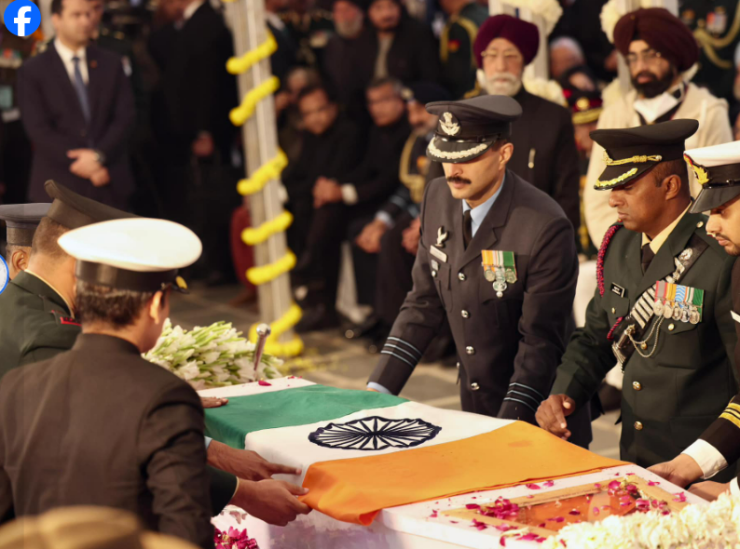
Former Indian Prime Minister Manmohan Singh, the architect of India’s economic liberalisation, died on 26 December, government officials announced. He was 92. Singh, who transformed India’s economy and later served as Prime Minister from 2004 to 2014, was cremated with full state honours on December 28, at Nigambodh Ghat in New Delhi.
The funeral procession, which drew thousands of mourners, saw Prime Minister Narendra Modi, Congress leaders Rahul and Sonia Gandhi, and numerous international representatives paying their last respects. The Ministry of Home Affairs declared a seven-day mourning period, with flags flying at half-mast across the nation.
“Dr Singh was a true statesman whose strategic vision and political courage were instrumental in fostering unprecedented cooperation between India and the United States,” U.S. President Joe Biden said in a statement. Biden highlighted Singh’s role in the India-U.S. Civil Nuclear Agreement and the establishment of the Quad alliance.
The Catholic Bishops’ Conference of India (CBCI) issued a moving tribute to Singh’s commitment to minority rights. “His contributions to the country’s growth and development are immeasurable. Moreover, his commitment to the well-being of minority communities is a testament to his dedication to social justice and equality,” CBCI President Most Rev. Andrews Thazhath said in an official statement.
Prime Minister Modi honoured Singh’s extensive efforts to improve citizens’ lives during his tenure, while Congress President Mallikarjun Kharge described his passing as an “irreparable loss” to Indian politics.
Regional leaders joined in mourning Singh’s death. Pakistan’s Deputy Prime Minister Ishaq Dar acknowledged Singh’s wisdom and commitment to regional peace, while Bangladesh’s Chief Advisor Muhammad Yunus praised his visionary leadership in strengthening bilateral ties. U.S. Secretary of State Antony Blinken called Singh one of the “greatest champions” of U.S.-India strategic partnership.
French President Emmanuel Macron described Singh as “a great man” and a “true friend,” while Russian President Vladimir Putin called him an “outstanding statesman.” In a particularly touching tribute, Malaysian Prime Minister Anwar Ibrahim recalled how Singh had offered scholarships to Ibrahim’s children during his imprisonment, reflecting the former Indian leader’s personal compassion.
Singh’s most significant impact came as Finance Minister in 1991 when he spearheaded economic reforms that transformed India’s economy. His policies dismantled trade barriers, deregulated industries, and opened the country to foreign investment. These reforms are widely credited with laying the foundation for India’s emergence as a global economic power.
The announcement of a memorial in Singh’s honour has sparked political debate. BJP spokesperson Amit Malviya accused the Congress party of politicising Singh’s death after Congress President Mallikarjun Kharge requested a specific memorial site. Despite these tensions, the government has confirmed that plans for the memorial will proceed, with details expected in the coming weeks.
Singh’s last journey began at his residence and proceeded to the Congress headquarters on Akbar Road, where party members and the public paid their final respects. Military honours marked the ceremony, with soldiers playing drums in tribute to the former leader.
Beyond his economic legacy, Singh’s tenure as Prime Minister saw significant diplomatic achievements, including the 2008 nuclear agreement with the United States, which established India’s position as a responsible nuclear power. His quiet demeanour and technocratic approach stood in stark contrast to more flamboyant political styles, earning him respect across party lines.
As India enters 2025, Singh’s passing marks the end of an era in Indian politics. His economic reforms lifted millions out of poverty, while his commitment to inclusive growth and social justice reshaped the nation’s trajectory. He is survived by his wife, three daughters, and grandchildren.
The government’s seven-day mourning period concludes on January 1, but discussions about Singh’s lasting impact on Indian politics, economics, and diplomacy continue to dominate national discourse. Plans for the memorial are expected to be finalised in the coming months, ensuring that his legacy will be preserved for future generations.




